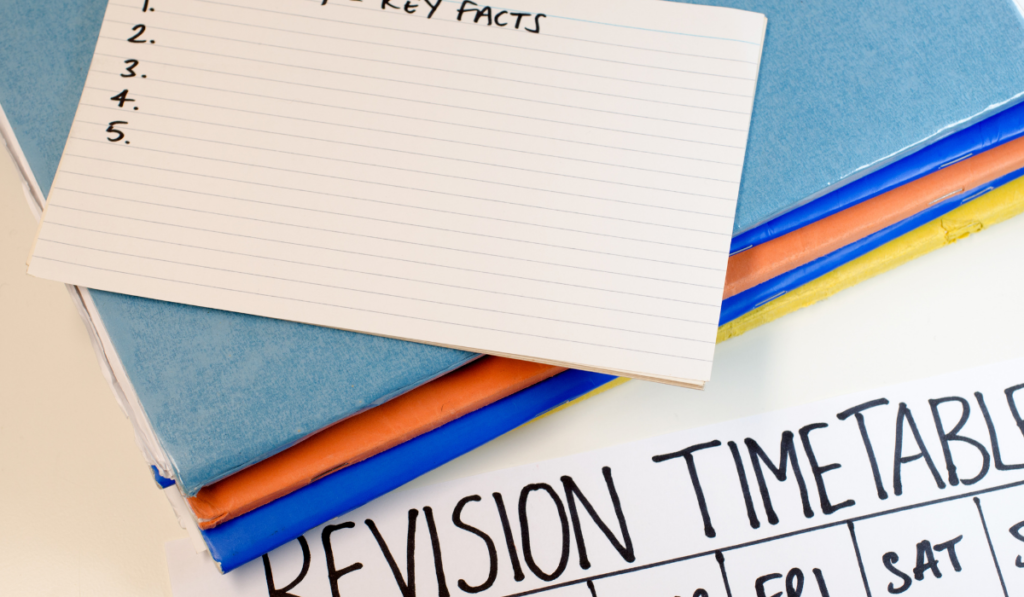The good news is that the end of the year brings a well-deserved break. The bad news is that you probably have exams either before the holiday or immediately after. Here are some of our best revision tips to keep your exam stress low and your grades high this December.
1. Start early
The most important of all our revision tips is to begin preparing for the exam period well in advance. The more time you give yourself, the more thorough you can be. In addition, if you spread your work over more weeks, you don’t need to push yourself so hard each day. You’ll have more flexibility to take time off for special occasions, or just when you’re not in the mood to study!
But what about if you’re reading this the week of your exam and thinking, ok that sounds nice, but too little too late? We don’t recommend cramming, but sometimes there’s no alternative. Use Proprep‘s video tutorials to make your revision as efficient as possible, especially when time is limited!
2. Create a good timetable
If you’ve managed to start revision in advance, work out how much time you have left and divide it up into study sessions. Make a revision timetable and stick to it!
As we wrote in our time management tips, different people work better at different times of day and in different ways. For example, I know that I like to change up what I’m doing every hour. That way I don’t lose focus and can stay productive for longer. If I’m doing this, I can revise well from the morning until about 6pm, but I hate studying into the night. If you’re not sure how you function best, try a few different ways until you find a schedule you like. Remember to take enough breaks to keep you sane and avoid burnout!

3. Find the right location to study
This might sound too basic for our revision tips, but it couldn’t be more important. What works for you might not work for a friend, and will probably be dependent on how you like to revise. If you need motivation to get your head down, go to the library. However, if you like to study in the early or late hours, your room may work out better.
Wherever it is, make sure you have a clean, well-lit, quiet space that you can focus in. Snacks within reach are an added plus!
4. Work on your weak areas
We all like to play to our strengths. However, if you only ever revise what you’re good at, you’ll never improve. Get real about which are your weaker areas, and dedicate more time to those when you’re making your schedule. Figure out how you can improve in these areas – do you need to do extra background reading? Can you ask a coursemate for help? If it’s time management itself that is a weak area for you, check out our blog about working on it!
If you’ve missed a few lectures over the course of the term, it’s all good. Proprep‘s video tutorials and study guides can help you if you need to go over content. This is true whether you were in the room but zoned out, or hungover in bed!
5. Use memory tools
Now to the actual revising. The goal of revision is to retain information you can then bring out to answer the exam questions. If you don’t have a good memory, this might feel a bit daunting. However, there are tons of things you can use as memory aids. Notes, flash cards, diagrams, flowcharts… If something’s worked for you in the past, use it again. Otherwise, again, try out a few techniques to see what feels the best.
Visual learners like using bright colours and aesthetically-pleasing notes to aid their revision process. Check out the world of Studygram if that applies to you!
6. Take advantage of resources
Be sure to use all the course resources your professors point out to you. They’ll have guidance, extra support, and revision tips for you to use. Alongside these, you can do your own research to find resources that’ll help you expand your knowledge of the subject.
Try Proprep‘s video tutorials if you want learning tools customised exactly to your STEM course. Don’t waste your time with material that’s not relevant to what you’re studying! If you can’t find a module, send us your syllabus to receive materials created especially for you. Plus, if you’re stuck on anything, you can send your questions directly to our professor team! They’ll respond shortly with a personalised video answer.
7. Practice makes perfect
Ok, so you think you have the theory down. The best way to test your understanding is to get as much practice answering questions as possible. Past papers will help you hone your answers as well as familiarising you with the format of the exam. For example, if you have a choice between two sections, you can decide which areas to prioritise in your revision. Try your hand at attempting problems under time pressure, and without looking at solutions or using any help.
If you’re looking for more opportunities for improvement, there are thousands of practice problems on the Proprep platform. Have a go at them, and watch the video solutions if you need to see where you went wrong.

8. Study with your peers
Revising with friends is a great way to work socialising into your study schedule. As well as being an important break from staring at your notes all day, you can learn from one another. You’ll get to share resources, revision tips, and info. Study groups are great if you want to brainstorm in a big group, but so are one-on-one sessions with a friend. Choose to focus on a certain topic area every time you meet up, and bring your notes and other materials you might need.
This one is harder to achieve if you’re home studying during the Winter holidays. However, sometimes even working next to someone doing something completely different to you will help keep you focused for longer. The perks of peer pressure! Invite friends over, catch up for a little while, then get down to business.
What are your best revision tips?
Did we miss anything important? Have you tried any of our revision tips and found they helped you reduce exam stress? Let us know in the comments below! We can’t wait to hear from you.






